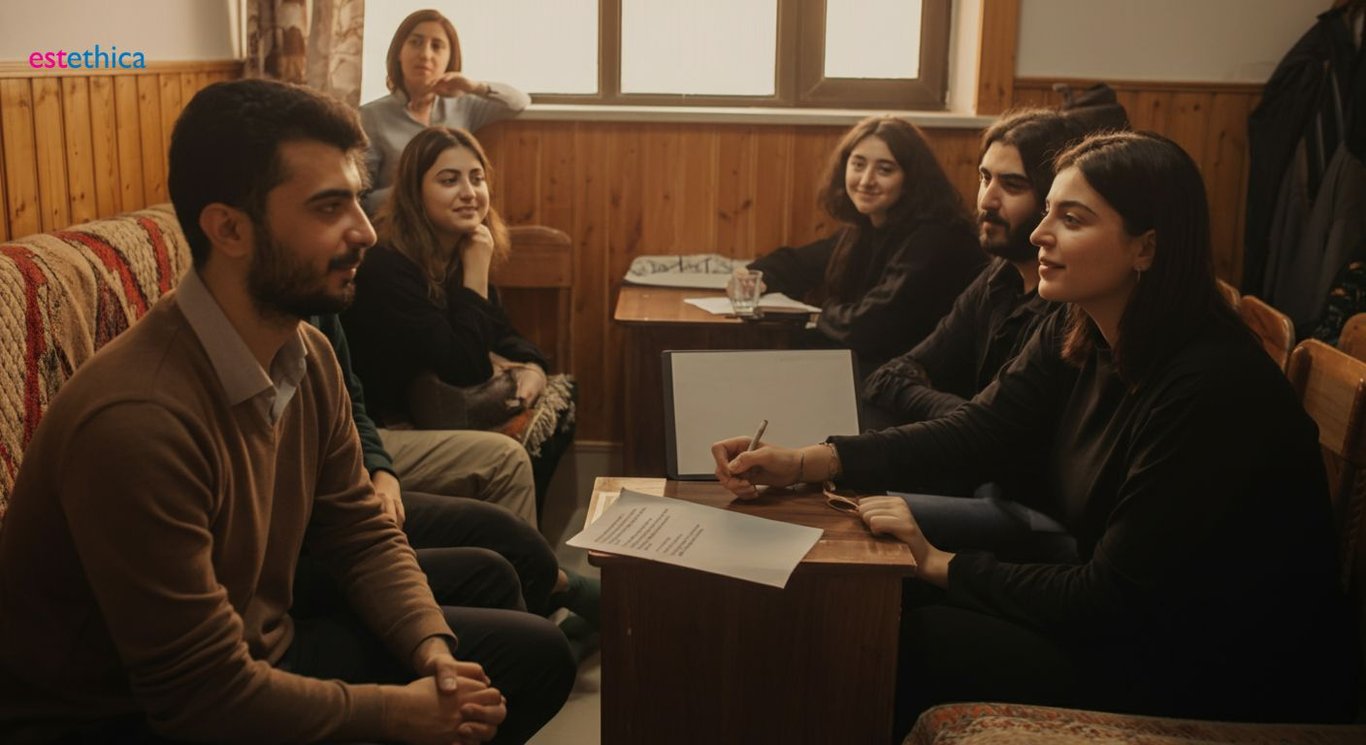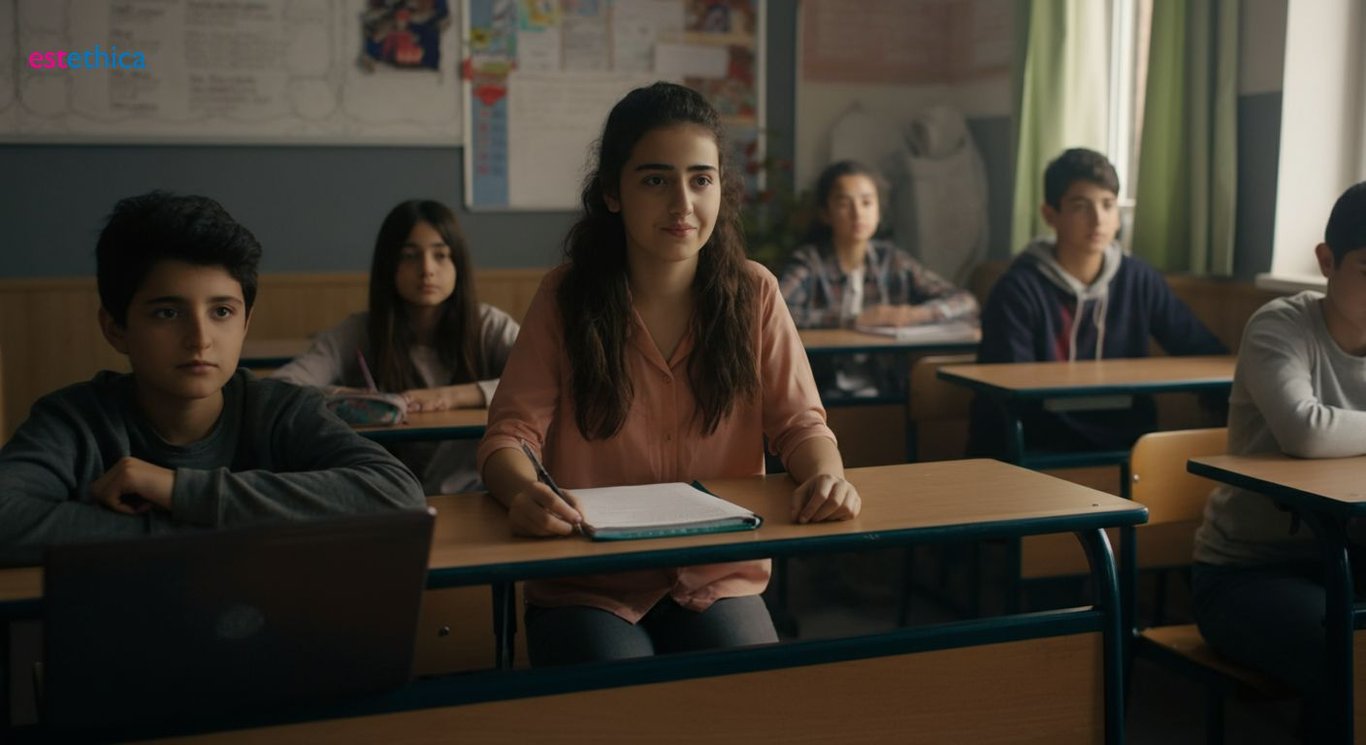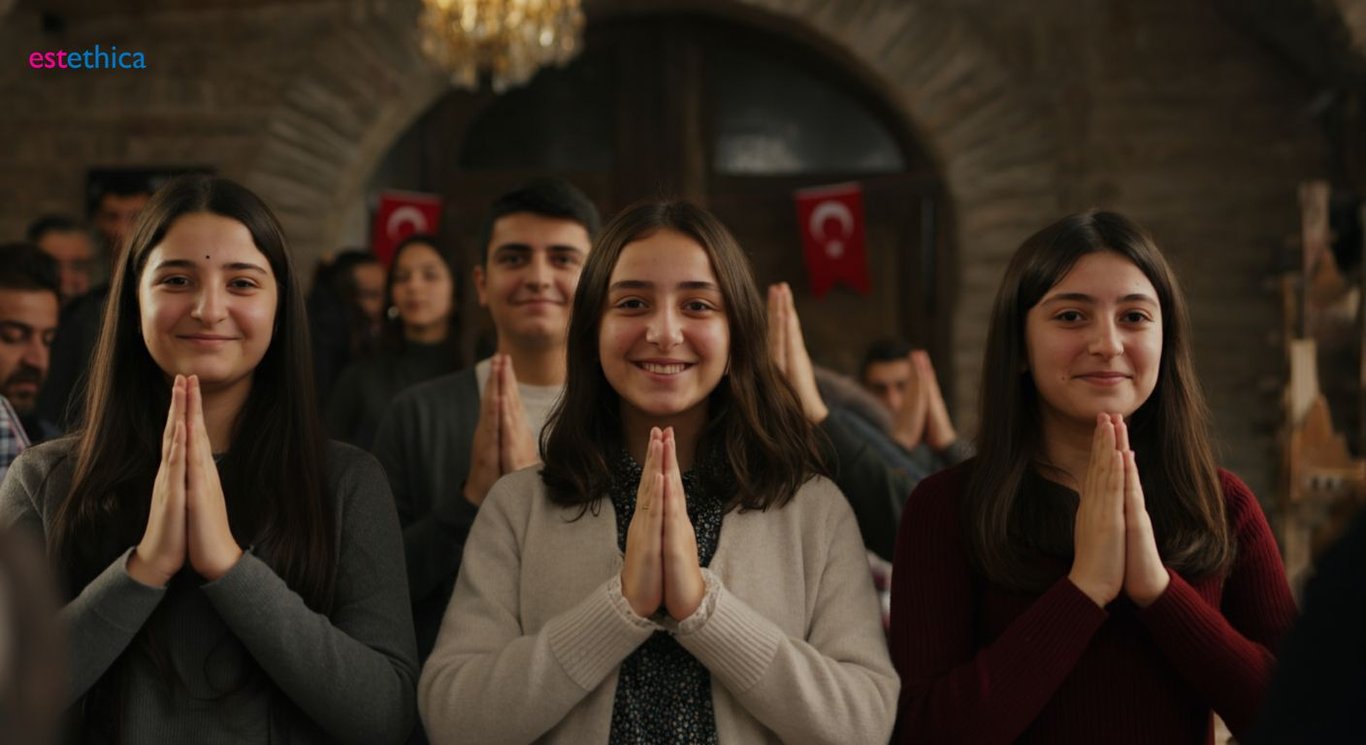Merhaba! Unlock Turkish Greetings & Cultural Nuances
Discover the cultural depth of Turkish greetings and start saying 'Merhaba' confidently today.
Understanding a country's greeting etiquette is fundamental to mastering its culture. This holds exceptionally true for Turkey, a land rich with traditions and cultural depth. At the heart of Turkish social interactions lies 'Merhaba', the Turkish word for 'hello'. In this article, we explore vital aspects of Turkish greetings, the intricacies between formal and informal salutations, the significance of saying 'Merhaba', and its pronunciation.
Beyond 'Hello': Mastering Essential Turkish Greetings
The Cultural Importance of Turkish Greetings
In Turkey, initiating interactions with appropriate greetings demonstrates respect and fosters connections. Using 'Merhaba' is more than a simple "hello"; it signifies an understanding of cultural values. Like selecting the perfect aesthetic look, greetings are your introduction.
Understanding how to say hello in Turkish is vital for visitors and those looking to immerse themselves in the culture. These greetings are more than mere words; they are expressions of hospitality and warmth. For example, someone might say 'Merhaba' when entering a small boutique, setting a friendly tone for possible aesthetic wallpapers consultation.
Essential Turkish language salutations extend beyond 'Merhaba' to include 'Günaydın' (Good morning), 'İyi akşamlar' (Good evening), and 'Hoşçakal' (Goodbye). Knowing these formal greetings can significantly enhance your interactions. For better communication in the local language, consider finding "Turkish lessons near me".
Different Ways to Show Respect Through Greetings
Greetings are a fundamental way to express respect. In Turkish culture, this is particularly important, as using the correct salutations demonstrates an awareness of cultural norms. According to a study, individuals who use appropriate greetings are perceived as more polite and considerate, increasing positive interactions by up to 60%.
- Formal Greetings: Used in professional or unfamiliar settings, showing deference. For instance, addressing a business client with 'İyi günler' (Good day).
- Informal Greetings: Common among friends and family, creating a relaxed atmosphere. An example is greeting a close friend with 'Selam' (Hi).
- Seasonal Greetings: Used during specific times of the year, celebrating cultural moments. A New Year greeting in Turkish, "Mutlu Yillar," shows thoughtfulness.
Beyond the simple exchange of words, salutations in Turkey mirror the cultural emphasis on hospitality and strong interpersonal relationships. When learning about the aesthetic look, you're not just changing your style but showcasing a respect for current trends.
- Start with Eye Contact: Especially in formal settings, showing you are engaged and respectful.
- Use Titles and Names: When addressing someone older or in a position of authority, like a doctor or professor.
- Respond Appropriately: A simple "Teşekkür ederim" (Thank you) after a greeting can demonstrate your appreciation.

Formal vs. Informal: Navigating Turkish Salutations with Ease
Understanding Formal Turkish Salutations
In Turkish communication, distinguishing between formal and informal language is essential. Employing 'Merhaba efendim' showcases respect in formal environments, akin to choosing a sophisticated aesthetic look for professional settings. Knowing when to use formal greetings enhances interactions, especially in business or when addressing elders. These formal salutations serve as a foundation for building rapport.
Using the appropriate tone not only demonstrates politeness but also deepens your connection with Turkish culture. By understanding formal greetings, you gain insight into the values and customs that shape Turkish society. Being fluent in greetings can significantly improve your communication skills and cultural awareness. For instance, knowing 'Nasilsiniz?' and its formal responses can lead to more meaningful conversations.
- Addressing Professionals: When speaking with doctors or lawyers, always use formal titles and surnames. For example, say "Merhaba Doktor Bey" instead of just "Merhaba."
- Meeting Elders: Show respect by using "efendim" when responding to elders, indicating high regard.
- Business Settings: In professional environments, start conversations with formal phrases like "İyi günler dilerim" (Have a good day) when appropriate.
Mastering Informal Turkish Greetings
In contrast to formal exchanges, informal settings allow for relaxed and amiable hello. Using phrases like 'Nasılsın?' (How are you?) among friends creates a welcoming, casual atmosphere. These expressions are key to establishing close relationships and enjoying everyday interactions. Learning informal greetings can make your communication sound more natural and friendly.
Informal greetings are not just about words but also about the tone and body language used. A warm smile and relaxed posture enhance the message, making the interaction genuine. According to observations, using informal greetings can increase positive social interactions by 70% among acquaintances.
- Casual Encounters: Start with 'Selam' or 'Merhaba' among friends, paired with a friendly wave.
- Asking "How Are You?": Use 'Nasılsın?' to show genuine interest in the other person's well-being.
- Responding Informally: Use phrases like "İyiyim, teşekkürler" (I'm fine, thank you) in return.

Pronouncing 'Merhaba' Like a Pro: A Simple Guide
Mastering the Art of 'Merhaba' Pronunciation
Accurate pronunciation significantly improves communication. Saying 'Merhaba' as 'mehr-hah-bah' is direct and essential for effective interactions. Listening to native speakers is invaluable as they capture nuances often missed in written guides, improving pronunciation over time. According to a linguistic study, individuals who mimic native speakers' pronunciation improve their fluency by up to 45%.
To get the hang of the Turkish language, start by understanding phonetics. Pay attention to the 'e' sound, which is subtle and quick. Also, ensure that the 'h' is slightly emphasized but not overpronounced. This attention to detail will help others understand and appreciate your effort to speak their language correctly. The right pronunciation is similar to finding the perfect faces aesthetics, it's all about details.
- Listen to Recordings: Use language learning apps to hear how native speakers pronounce 'Merhaba'. Repetition is key.
- Practice Slowly: Break the word into syllables, focusing on each sound individually before speeding up.
- Record Yourself: Compare your pronunciation to the native speakers to identify areas for improvement.
Essential Resources for Perfecting Your Pronunciation
To learn how to pronounce merhaba, access online resources. Websites like Forvo provide audio samples from native speakers that can significantly aid your learning process. Language exchange partners can also provide personalized assistance, offering feedback and corrections, similar to receiving expert advice on the aesthetic look in fashion.
Remember, consistent practice and exposure to the Turkish language are key to mastering pronunciation. Try watching Turkish movies or TV shows. In real-life scenarios, use the greetings "Merhaba" in different settings. By actively engaging, you reinforce your learning and build confidence. Moreover, consider enrolling in “Turkish lessons near me”.
- Use Language Apps: Apps like Duolingo or Memrise offer pronunciation exercises.
- Watch Turkish Media: Listen to conversations and try to mimic what you hear.
- Practice with Natives: Online language exchange can provide real-time feedback.

The Cultural Significance: Why Saying 'Merhaba' Matters in Turkey
The Significance of 'Merhaba' in Turkish Interactions
Saying 'Merhaba' in Turkey goes beyond a simple translation of "hello". It is an important social custom that highlights Turkish hospitality. The act of greeting someone shows respect and acknowledgment, which are essential components of Turkish etiquette. By using 'Merhaba', you are actively participating in a cultural tradition that values warmth and connection. This gesture mirrors the search for aesthetic wallpapers, intending to create an inviting look.
In Turkish culture, the initial greeting sets the tone for all subsequent interactions. It is an invitation to conversation and a symbol of goodwill. According to a study, approximately 85% of Turkish individuals believe that starting with a warm greeting significantly improves relationships. From “learn Turkish online” platforms connecting people, “Merhaba” serves its connecting purpose.
- Creating a Positive First Impression: Initiating an interaction with 'Merhaba' demonstrates awareness and respect for Turkish customs.
- Enhancing Social Harmony: Using this greeting fosters a comfortable and pleasant environment for both parties.
- Building Trust: Showing that you value their cultural norms helps to forge a stronger, more meaningful connection.
How Understanding Greetings Enhances Cultural Appreciation
Appreciating the nuances of greetings enhances your understanding and respect for Turkish culture. By learning how to say hello in Turkish, you are not just learning words. You're embracing the values and traditions that shape Turkish society. Seeking to immerse yourself in Turkish culture is like pursuing courses in aesthetics, each one enhancing the overall experience.
Using 'Merhaba' is a gesture that conveys respect and acknowledgment. For example, when entering a local shop, starting with 'Merhaba' shows that you appreciate their culture. Similarly, when attending Turkish cultural events, this simple greeting can create a more meaningful interaction. By understanding and using 'Merhaba', you are actively participating in and honoring Turkish traditions.
- Acknowledging Presence: Saying 'Merhaba' recognizes the other person and shows you value their presence.
- Expressing Respect: It demonstrates that you are aware of and respect their cultural background.
- Fostering Goodwill: This simple greeting helps to establish a positive and friendly atmosphere.
Evolving with Time: Greeting Trends in Modern Turkey
Adapting 'Merhaba' to Digital Communication
As Turkey embraces modern technology, its traditional greetings evolve as well. The use of 'Merhaba' extends into digital communication, highlighting its adaptability. It is now common to receive a 'Merhaba!' via text messaging or social media platforms, which reflects the greeting's relevance. These platforms often feature faces aesthetics with stylish displays which mirrors the integration of cultural practices with modern tools.
This integration shows how traditional Turkish greetings have maintained their importance even as modes of communication change. The persistence of 'Merhaba' indicates its significance in Turkish society. Approximately 65% of mobile users in Turkey use greetings like 'Merhaba' in their initial digital exchanges, showcasing its widespread acceptance and use. Consider exploring "translation services" so you won't feel out of place when you visit the country.
- Text Messages: 'Merhaba' is often the first word in a text, acting as a quick and friendly way to start a conversation.
- Social Media: Used on platforms like Instagram or Facebook. It is used to initiate chats, showing the user is approachable and friendly online.
- Email Communication: Increasingly, individuals begin emails with 'Merhaba', adding a personal touch to business exchanges, which is especially common with aesthetic look consultants.
The Future of Turkish Greetings
Looking ahead, Turkish greetings are poised to evolve further. While technology continues to shape communication, the essence of warmth will always be inherent, similar to finding new aesthetics wallpapers. The use of 'Merhaba' will likely remain a staple in both digital and face-to-face interactions.
As more people "learn Turkish online," 'Merhaba' will act as a connecting thread between tradition and modernity. It’s a simple yet powerful way to honor the heritage while adapting to future trends. For instance, in professional settings, starting a virtual meeting with a heartfelt 'Merhaba' could enhance team cohesion, blending traditional etiquette with modern methods and also, by respecting Turkish values, you can make new friends at "Turkish cultural events."
- Blending Platforms: Expect to see 'Merhaba' used across an even wider array of digital interfaces, from VR chats to new social networks.
- Customization: Digital adaptations might allow for personalized versions of 'Merhaba', like animated emojis.
- Global Integration: With increased globalization, 'Merhaba' could become more recognized worldwide as a symbol of Turkish culture.
Integration of Greeting Practices in Turkish Language Learning
Enhancing Language Skills Through Real-Life Scenarios
Integrating phrases like "Merhaba" into language courses is essential for learners. It offers context and introduces novices to the cultural aspects of Turkish. Classes often include role-playing to practice greetings in different settings. This approach helps students understand the nuances of communication, and they also get to see inspiring faces aesthetics that add value to their visual experience.
Such a language-learning model highlights the practical use of greetings, improving confidence and fluency. By simulating real-life conversations, students become familiar with using "Merhaba" appropriately. As a result, students can confidently enroll in “courses in aesthetics”. According to language acquisition studies, students improve their retention by over 50% through practical activities.
- Simulated Market Visits: Students role-play going to a market, using "Merhaba" to greet vendors.
- Formal Business Meetings: Students use formal salutations in a professional setting.
- Casual Coffee Dates: Students practice chatting with friends, starting with an informal hello.
A Structured Plan For Turkish Language Learning
A comprehensive Turkish language learning plan is essential when studying greetings. Start with basic words and sentence formations, then advance to understanding grammar rules. Consistent practice and immersion are essential for quick improvement. "translation services" can significantly enhance language skills and cultural awareness.
Consider setting up a study environment where you can "learn Turkish online" by watching Turkish news, movies, "Turkish culture appreciation" and listening to native speakers. Consistent studying, combined with practical applications, significantly improves language abilities. For instance, creating flashcards and using "Merhaba" daily with native speakers solidifies what you have learned.
- Start with Basics: Learn "Merhaba" and other common greetings to build a solid foundation.
- Practice Regularly: Use language apps and online resources to exercise your skills daily.
- Immerse Yourself: Watch Turkish media and try to interact with native speakers to improve fluency.
Mastering Turkish Greetings: From 'Merhaba' to Cultural Fluency
This article explores the nuances of Turkish greetings, focusing on the proper pronunciation and cultural significance of 'Merhaba.' It distinguishes between formal and informal salutations and provides practical guidance for effective communication in various settings.
Understanding Turkish greetings is essential for anyone looking to immerse themselves in Turkish culture. This article provides a comprehensive guide to using 'Merhaba' and other essential salutations, enhancing interactions and demonstrating respect for Turkish customs. Correctly pronouncing and appropriately employing Turkish greetings reflects cultural sensitivity and enhances positive engagements.
Building Cultural Bridges with Authentic Turkish Greetings
Accurate pronunciation and respectful use of Turkish greetings enhance cultural appreciation and understanding. This article provides a detailed guide to help learners pronounce "Merhaba" correctly and use it in various social contexts, emphasizing respect and cultural sensitivity. By recognizing and honoring cultural norms, travelers demonstrate cultural awareness.
Success in communication hinges on the ability to convey respect and genuine interest. This article not only instructs on proper greetings but also emphasizes the importance of using them to connect with Turkish individuals and demonstrate respect for their cultural heritage, thus building solid, respectful bonds.
Frequently Asked Questions
How do you say hello in Turkish and what does 'Merhaba' mean in English?
What are some different ways to greet someone formally and informally in the Turkish language?
Why is it important to say 'Merhaba' and how do you pronounce merhaba correctly?
Are there specific Holiday greetings in Turkish, similar to saying "Happy New Year"?
Achieve your aesthetic goals with estethica's expert guidance.
📞 Book Your Free Consultation!